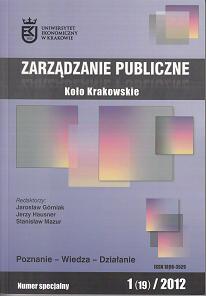Social imaginaries, structuration, learning, and ‘collibration’:
Th eir role and limitations in governing complexity
Social imaginaries, structuration, learning, and ‘collibration’:
Th eir role and limitations in governing complexity
Author(s): Bob JessopSubject(s): Social Sciences
Published by: Uniwersytet Ekonomiczny w Krakowie we współpracy z Wydawnictwem Naukowym Scholar
Keywords: structuration; learning; collibration; governace
Summary/Abstract: my contribution to this special issue of Zarządzanie Publiczne will undertake fi ve tasks: (1) present the key concepts for an analysis of complexity and its reduction through semiosis and structuration; (2) elaborate the notions of lived experience (tied to personal identity or consciousness), social imaginary, and ideology (which involves more than social imaginaries); (3) introduce the key concepts for the study of structuration, including spatio-temporal fi x, structural coupling, and ecological dominance; (4) introduce the notion of learning as a crucial intermediary between lived experience and social structuration; and (5) show how different forms of coordination of complex interdependence have developed to address these problems, how they fail, and how individual and social agents seek to address governance failure through new forms of imaginary and new eff orts at ‘collibration’. My contribution ends with some remarks on a research agenda based on these arguments and a practical agenda oriented to better governance based on ‘romantic public irony’ as a way of ‘going on’ in a deeply complex world.
Journal: Zarządzanie Publiczne
- Issue Year: 2012
- Issue No: 19
- Page Range: 71-83
- Page Count: 13
- Language: English

